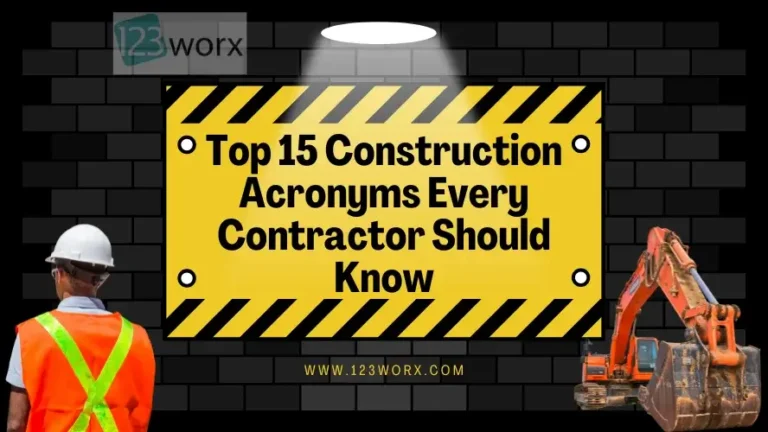Written by 123worx – The cloud-based construction management software built to empower contractors to scale smarter and grow locally.
Why Local SEO Matters More Than Ever for Contractors?
In 2025, it is an extremely competitive, ever-changing marketplace. If you are in the business of custom homes, remodels, or specialty trades work, one of the best ways to get more bids and grow your construction company is to stand out in your community. That’s where Local SEO is your digital roadmap to long-term exposure.
Most people are searching for contractors today, on the Internet, using search phrases like “roofing contractor near me” or “kitchen remodeler in Ontario.” If your business is not ranking on Google Maps, packs, or local search results, you are leaving money on the table. We are going to break down what Local SEO is, why construction contractors need it, and the top 5 proven strategies to drive local traffic, leads, and calls.
In addition to this, successful local search marketing will reduce your dependence on pricey ads and give you a long-term way to build brand recognition within your service area. It is one way to level the playing field so smaller contractors can compete with larger contractors on the Internet.
What is Local SEO for Construction Contractors?
Local SEO is the process of optimizing your web presence to get your construction company to appear when any potential customer within your area is looking for your type of service. It includes:
- Google Business Profile (Google My Business)
- Local directories and citations
- City- and service-specific keyword research
- Customer Reviews and Ratings
- Mobile search optimisation
While the standard SEO gets your site ranked worldwide or nationally, the local one is all about geographic specificity and gets you ranked for things like:
- “Basement finishing contractor in Toronto”
- “Top-rated home builders near Atlanta”
- “Remodeling company in Austin, TX”
The real power of local SEO lies in its intent-driven traffic. People searching for one service or the other around their location are usually close to making the purchase decision, and hence, local SEO is the best method for lead generation.
Why Construction Contractors Need Local SEO?
Most contractors rely on word-of-mouth and referrals, but are not scalable on their own. Local SEO reinforces referrals by assisting:
- New clients find out about your services through search engines
- Establish trust with reviews and neighborhood visibility
- Overcome competitors not investing in SEO
- Increase call numbers, site visits, and quote requests
To remain competitive in the construction industry, your business needs to ensure visibility on Google’s first page when homeowners and commercial builders perform online searches from both mobile devices and desktop computers. With local, mobile-only web searches making up most of contractor-specific searches, local SEO isn’t just a marketing tactic; it’s a growth strategy.
Local SEO contractors not only gain more visibility but they are able to build their local reputation as well, making prospective clients more comfortable to call and book their services directly through the search engines.
How Local SEO Builds Contractors’ Businesses?
Local SEO impacts nearly all of your sales process contact points:
- Mobile Searches: Searches that are “near me” account for 46% of all Google searches.
- Google Business Profile visibility: A fully filled-out and confirmed profile builds trust and map awareness.
- More inbound leads: Local listings bring more high-intent traffic.
- Improved reputation: Reviews build trust and improve search ranking.
Locally ranked contractors have shorter sales cycles, better identification of clients, and greater community exposure. It also supports hyper-local marketing, geo-specific promotions, and partnerships with local suppliers or organizations.
Local SEO establishes brand awareness within your region as well. The more often your business name appears on the inside of local search results, the more likely the potential customer is to trust and remember you.
Strategy 1: Optimize Your Google Business Profile (GBP)
Your Google Business Profile is the heart of your local search engine optimisation process.
Steps to enhance:
- Assert and verify your listing
- Include proper NAP (Name, Address, Phone)
- Develop a good business description with keywords
- Choose the correct type of service (e.g., “Home Builder,” “Contractor”)
- Send us high-quality images of your projects
- Weekly post updates, promotions, or project showcases
- Facilitate message sending and list working hours
This helps your business appear on Google Maps, the Local Finder, and the 3-Pack. Active GBP listings receive more call-throughs, map views, and click-throughs.
Tip: Add before-and-after photos of recent work to showcase your skills and get the attention of potential clients when they visit your GBP listing.
Strategy 2: Build Local Citations & Constant NAP Listings
Citations are mentions of your business in directories such as Yelp, Houzz, Angi, HomeAdvisor, BBB, and chambers of commerce listings.
Key Tips:
- Use the same Name, Address, and Phone Number (NAP) on all directories
- Submit your company to the relevant regional and industry directories
- Use citation tools like Whitespark or BrightLocal for scalability
- Regular referencing increases the search engine credibility, together with the legitimacy in the regional markets.
Bonus tip: Don’t ignore niche construction directories and trade association listings. These typically have high authority and can help boost your ranks for industry-specific searches.
Strategy 3: Get Internet Reviews from Satisfied Customers
Your customer reviews are ranking factors for both your site and Google Business Profile.
Request happy clients to review:
- To close out projects by email or text confirmation
- Add direct links to your Google review page
- Respond to every review (good and bad) in a professional manner
More 5-star reviews translate to:
- Increased prominence on local search pages
- Increased trust and conversions
- Boosted brand image
- Do not forget to incorporate reviews on your site for SEO as well.
Pro tip: Place a QR code on invoices or job completion forms to your review page for an even more seamless way to leave a review.
Strategy 4: Target Local Keywords with Geo-Modifiers
Geo-targeted keyword phrases tell search engines about the local intent of your services.
Examples:
- “Remodeling bathrooms in Chicago”
- “Vancouver house builder”
- “Framing contractor around Phoenix”
What to optimize:
- Create location-specific landing pages (ex.,/toronto)
- Utilize regional keywords in the meta title, description, headers, and content.
- Add location-specific schema markup (LocalBusiness, Organization)
- Include landmarks or neighborhoods for local context
This increases prominence for “near me” and city-level searches.
You could incorporate statements from the clients there to add more authenticity and persuasiveness to each of the landing pages for users, as well as search engines.
Strategy 5: Publish Location-Specific Blog & Project Content
A blog is not just for country-wide keywords, but it is potent for location-based rankings too.
Content ideas:
- Presentations of projects for specific cities (“Custom Home Build in Ottawa – Case Study”)
- Local construction trends (“Top Home Design Trends in Ontario”)
- Community updates postings (“123worx at Ottawa Builder’s Expo”)
- Local seasonal advice (“Preparing Your Basement for Toronto Winters”)
Incorporate geo-modifiers into your internal links, headings, and image alt-text.
Recurring updates on new projects or community work will build cred at the local level and show prospective clients that your company is busy and active in the community.
How is Local SEO Different from Paid Ads?
Unlike paid Google Ads or Yelp ads, long-term organic prominence is achieved through local SEO.
Main differences:
- Cost-effective: Established organic traffic continues with zero ongoing ad spend
- Greater trust: People trust the results of organic search more than advertisements
- Compounding value: Each blog post, review, or page you publish grows your search footprint
Paid advertising offers immediate online presence, but SEO develops sustained digital equity for your construction company.
A combination of both is often best: SEO for the long-term and paid promotions for quick visibility, especially during holiday periods and sales events.
How to Measure Local SEO Success?
Local search engine optimization monitoring is essential to refine your strategy.
What to measure:
- Local keyword rankings (use tools like SEMrush, BrightLocal)
- Google Business Profile Insights: direction requests, calls, messages
- Website traffic categorized by location
- New leads and quote requests concerning regional enquiries
Data-driven methodology ensures you’re always improving yourself and showing ROI.
Don’t look just at traffic; monitor how many of those visitors turn into real leads or calls. That’s the real test of success for contractors when it comes to SEO.
Dominate your Local Market with Local SEO
Local SEO isn’t optional for construction contractors. It’s the most effective way to grow your business regionally. These 5 highly effective strategies will position your company to stand out, build credibility, and reach new customers within your targeted service area.
Once your business starts to build a regional presence, its guiding principle should be “perform regularly.” Stay on top of updating your Google Business Profile. You’ll maintain citation consistency, collect reviews, and, with prepping informational content, you can have a solid presence all year long. By putting a few hours into this each month, you will see serious online authority build over time.

As a Vice President at 123worx, Construction Management Platform, Bharat Rudra has worked with hundreds of business executives searching for best-suited software for their construction business with a wide array of requirements. Bharat takes pride in helping construction businesses solve their business and project management challenges. Feel free to reach Bharat if you have any questions. You can find him on LinkedIn or reach him at brudra@123worx.com













